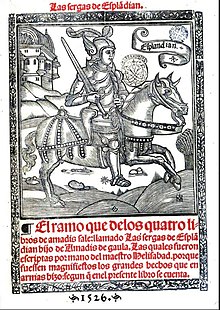Las sergas de Esplandián
 | |
| Author | Garci Rodríguez de Montalvo |
|---|---|
| Country | Spain |
| Language | Spanish |
| Genre | Chivalric romance |
| Published | July 1510 |
Las Sergas de Esplandián (The Adventures of Esplandián) is a novel written by
History
The original Amadis was in three volumes, but Montalvo added a fourth that is considered to be completely own work.[1] Upon completion, Montalvo wrote the sequel, Las Sergas de Esplandián, regarding the exploits of Esplandián, the son of Amadis.[2] The oldest known surviving edition of this work was published in Seville in July 1510. Earlier editions are thought to have been published in Seville as early as 1496. Ruth Putnam argues that Montalvo finished his novel sometime after 1492,[3] but before Queen Isabella died in 1504.[4] Montalvo is thought to have died in 1505,[2] leaving some of his works to be published after his death.[5]
In the sixth chapter of Don Quixote, written by Miguel de Cervantes in 1605, Montalvo's sequel is mentioned as one of the books in Quixote's library. When Quixote's niece, the housekeeper, and the parish curate set out to destroy Quixote's library, considered the source of Quixote's fanciful behavior, Las Sergas de Esplandián is the first book selected for the pyre.
The first that master Nicholas put into his hands was Amadis de Gaul, in four parts; and the priest said, "There seems to be some mystery in this, for as I have heard say, this was the first book of chivalry printed in Spain, and all the rest have had their foundation and rise from it; and therefore I think, as head of so pernicious a sect, we ought to condemn him to the fire without mercy." — "Not so, Sir," said the barber; "for I have heard also that it is the best of all the books of this kind: and therefore, as being singular in his art, he ought to be spared." — "It is true," said the priest, "and for that reason his life is granted him for the present. Let us see the other which stands next him." — "It is," said the barber, "the Adventures of Esplandian, the legitimate son of Amadis de Gaul." — "Verily," said the priest, "the goodness of the father shall avail the son nothing; take him, mistress Housekeeper, open yon casement, and throw him into the yard, and let him give a beginning to the pile for the intended bonfire."
— Miguel de Cervantes, The Ingenious Gentleman Don Quixote de la Mancha, chapter 6, translated by Charles Jervas[6]
California
Chivalric novels were popular at the time the Spanish empire was beginning to explore the New World. Such novels were a mix of truth, lore, and fiction, but with little clarity as to where each aspect of the novels fell. The explorers used the novels as a source of inspiration, while the authors of the novels, in turn, used the reports of new explorations to embellish their tales.[7]
The Esplandián novel describes a fictional
References
- ^ "Garci Rodríguez de Montalvo". biografiasyvidas.com. Biografias y Vidas. Archived from the original on 26 July 2020. Retrieved 26 July 2020.
- ^ a b "Garci Rodríguez de Montalvo". La Real Academia de la Historia. Real Academia de la Historia. Archived from the original on 20 July 2020. Retrieved 26 July 2020.
- ^ Putnam, Ruth (1917-12-19). Stephens, Henry Morse; Bolton, Herbert Eugene (eds.). "California: The Name". University of California Publications in History. 4 (4). Herbert I. Priestley: 313–314. Retrieved 2014-07-14.
It seems a fair inference that Montalvo did not complete his own story of Esplandian's victories until after Columbus came back from his first voyage. Even if it appeared originally in 1496, the author would have had time to incorporate a fresh incident into his nearly finished 'copy.'
- Catholic Sovereigns in a way to show that they were both still in life, and Isabelladied in 1504.
- ^ "Garci Ordóñez de Montalvo". kids.britannica.com. Encyclopædia Britannica, Inc. Archived from the original on 27 July 2020. Retrieved 27 July 2020.
- ^ Cervantes, Miguel de (1923). "The Ingenious Gentleman Don Quixote de la Mancha". Google Books. Retrieved 28 July 2020.
- ^ , Polk, Chapter 1.
- ^ Rodríguez de Montalvo, Garci (1526) [1496]. Las sergas de Esplandián [The Adventures of Esplandián] (in Spanish).
Sabed que ala diestra mano de las Indias ouo una Isla llamada California mucho llegada ala parte del paraiso terrenal la qual sue poblada de mugeres negras sin que algun uaro entre ellas ouiesse: que casi como las amazonas …
(The first mention of "California" occurs on the unnumbered page after page CVIII, in the right column.)
Bibliography
- Polk, Dora Beale (1995). The Island of California: A History of the Myth. Lincoln, Nebraska: University of Nebraska Press. ISBN 0803287410.
External links
- 1526 edition, original from Library of Catalonia (digitized 2009)
- 1588 edition hosted by the Spanish national library
- Edward Everett Hale (1885) "The Queen of California" in His Level Best: And Other Stories. (Google eBook) Translation from the Sergas of Esplandian of every passage relating to the imagined island of California. Reprinted in part from an unsigned article in the Atlantic Monthly for March 1864.
- Griffin, Clive (2013). "More Books from the Sixteenth Century Printed in Seville by the Cromberger Dynasty". Bulletin of Spanish Studies. 90 (4–5): 679–718. S2CID 194054981.
